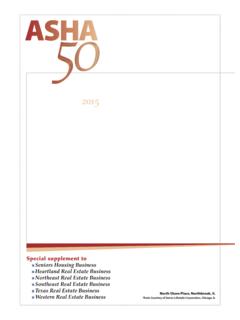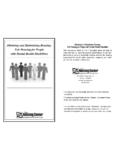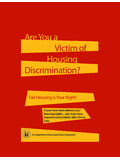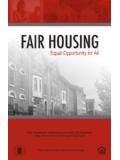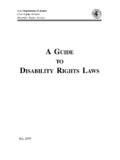Transcription of Seniors Housing Guide to Fair Housing and ADA …
1 Seniors Housing Guide to fair Housing and ADA ComplianceFifth Edition | By Paul Gordon, Wishes to Gratefully Acknowledge the Generous Support of Ventas, Inc. for this PublicationSeniors Housing Guide to fair Housing and ADA compliance Fifth Edition | By Paul Gordon, Esq. ASHA 2016 by the American Seniors Housing Association All rights reserved. The text portions of this work may not be reproduced or transmitted in any form or by any means, electronic or mechanical, including photocopying, recording, or by information storage and retrieval system without permission in writing from the publication is designed to provide accurate and authoritative information in regard to the subject matter covered. It is distributed with the understanding that the publisher is not engaged in rendering legal, accounting, or other professional services. If legal advice or other expert assistance is required, the services of a competent professional person should be sought.
2 From a Declaration of Principles jointly adopted by a Committee of the American Bar Association and a Committee of : $ (non-members) Seniors Housing Guide to fair Housing and ADA compliance 1 Seniors Housing Guide to fair Housing and ADA ComplianceFifth Edition | By Paul Gordon, RIGHTS AND RISKS2 Seniors Housing Guide to fair Housing and ADA Compliance2 Seniors Housing Guide to fair Housing and ADA ComplianceSeniors Housing Guide to fair Housing and ADA compliance 3 ABOUT THE AUTHORPAUL GORDON is a partner in the 165-attorney San Francisco law firm of Hanson Bridgett LLP. He is the author of the book Seniors Housing and Care Facilities: Development, Business and Operations, 3d edition (Urban Land Institute 1998). He is a member of the Executive Board and General Counsel to the American Seniors Housing Association and is former Chair of the Legal Committee of LeadingAge. Mr. Gordon s entire law practice is devoted to representation of Seniors Housing and long-term care operators, developers, investors and related more information, visit the.
3 4 Executive Summary ..6 Use Of This Guide ..8 Federal Anti-Discrimination Statutes ..10 I. The fair Housing Act ..11 A. The 1968 Act ..11 B. The fair Housing Amendments Act Of 1988 ..11 C. Religious/Private Club Exemptions ..15 D. Enforcement Of The fair Housing Act ..15 II. The Americans With Disabilities Act ..16 A. Covered Disabilities ..16 B. Businesses Subject to the Act ..16 C. Architectural Standards ..17 D. Prohibited Discrimination ..18 III. The Age Discrimination Act Of 1975 ..19 IV. Income Discrimination ..20 V. Marital Status, Sexual Orientation ..21 Managing Seniors Housing Discrimination Issues ..22 VI. Advertising ..23 A. In General ..23 B. Occupancy Preferences and Limitations ..23 C. Human Images ..24 D. Precautionary Steps ..25 VII. Occupancy Criteria ..25 A. Requirements of Tenancy; Reasonable Accommodation ..25 B. Independent Living Communities ..27 C.
4 Residences Providing Care ..30 D. Factors Incidental to Resident Health ..35 E. Age ..40 F. Use of Application Forms ..40 VIII. Access To Facilities And Services ..41 A. Walkers, Wheelchairs and Motorized Carts ..41 B. Dining Rooms and Other Common Areas ..43 C. Transportation and Parking ..47 D. Swimming Pools ..48 Recommendations ..50 Seniors Housing Guide to fair Housing and ADA compliance 3 TABLE OF CONTENTS4 Seniors Housing Guide to fair Housing and ADA ComplianceINTRODUCTIONS eniors Housing Guide to fair Housing and ADA compliance 5AS A LEADING VOICE for the nation s professional owners and managers of Seniors Housing , the American Seniors Housing Association (ASHA) is pleased to present this updated and expanded fair Housing /ADA compliance Guide , Fifth Edition. This publication is part of a long-standing communications and educational effort by ASHA to update members with timely information about evolving issues regarding fair Housing and ADA rules, court decisions and interpretations.
5 I am confident you will find this publication an invaluable and practical resource to enhancing operational compliance . We are especially fortunate to have Paul Gordon s expertise in this area, and his thoughtful, comprehensive analysis of the issues and practical approaches to making the subject matter relevant to your day to day operations. David S. SchlessPresidentAmerican Seniors Housing Association6 Seniors Housing Guide to fair Housing and ADA ComplianceEXECUTIVE SUMMARYS eniors Housing Guide to fair Housing and ADA compliance 7 THE Seniors Housing INDUSTRY continues to operate under increasing scrutiny regarding its fair Housing practices. Since the 4th Edition of this Handbook was published, the Department of Justice (DOJ), the Department of Housing and Urban Development (HUD), and other fair Housing enforcement agencies and advocacy groups have stepped up the level of challenges directly targeting Seniors Housing properties for allegations of disability discrimination.
6 Over the past year, the DOJ s focus has been to challenge continuing care retirement community (CCRC) dining room policies that would exclude private caregivers and assisted living residents from independent living dining rooms. Also, HUD has more strictly circumscribed the kinds of questions about a resident s health needs that can be asked by independent living providers. On the other hand, HUD has ruled that CCRCs may legitimately ask prospective residents questions about their health status, notwithstanding the fair Housing Act s broad prohibitions against disability-related questions as a condition of providing Housing . At the same time, courts struggle with the subtle dividing lines between discrimination and legitimate safety policies and practices and quality-of-care concerns. In addition to disability, race, religion, marital status, sexual orientation and age are key areas in which there may be liability.
7 Seniors Housing owners and operators would be well-advised to carefully review their advertising, policies and practices regarding new resident intake and contract termination, resident contracts and handbooks, and factors that might restrict a resident s access to facilities and services, and determine that they comply with federal and state fair Housing laws. It is important to consult legal counsel in such a process, as the issues can be subtle and complex. Every organization should also have a process for accepting and responding to requests for reasonable accommodation or modification. Training for key employees, particularly marketing staff and operations managers, is also important, as uninformed front line employees can unwittingly increase liability through their words and Housing is a contentious and rapidly evolving area of law. Executives should familiarize themselves with the basic issues and take action that results in a comprehensive and thorough risk management audit for their organizations.
8 To further assist you in protecting against risk for a discrimination claim, please refer to the recommendations provided at the conclusion of this Guide . 8 Seniors Housing Guide to fair Housing and ADA ComplianceUSE OF THIS GUIDES eniors Housing Guide to fair Housing and ADA compliance 9 THIS Guide is designed to identify fair Housing issues and approaches to compliance for Seniors Housing properties, including senior apartments, independent living,1 assisted living and CCRCs. Subjects covered include federal statutory, regulatory, and case law dealing with discrimination on the basis of age, health care status/disability, religion, national origin, sexual orientation, income and Typical operational situations for Seniors Housing communities, such as advertising, screening and acceptance of residents, access of occupants to facilities and services at the community, and relocation of residents, are identified and is a constantly expanding subject with sweeping laws that contain few details outlining the boundaries of appropriate conduct.
9 This compliance Guide is based upon the statutory language and major case holdings and is not intended to constitute legal advice. Often, the issues are so subtle, and the guidance of the courts and enforcement agencies so complex, fact-specific, or even contradictory, that it is difficult to articulate a course of action that is clearly right under a given set of circumstances. Seniors Housing owners and operators should consult legal counsel in determining how best to minimize the risk of a discrimination claim, and to respond to any actual Independent living properties, unlike senior apartments, usually offer hospitality services, which may include dining, housekeeping, transportation and recreational programs. Misapplication of the term independent living can raise disability discrimination issues (see Section ).2 The Guide does not attempt to discuss in detail the architectural standards for handicap accessibility, zoning and planning issues, or state or local anti-discrimination laws.
10 The issues and regulations particular to the development and operation of skilled nursing facilities and detailed discussion of Department of Housing and Urban Development (HUD) tenant selection standards are beyond the scope of this Seniors Housing Guide to fair Housing and ADA ComplianceFEDERAL ANTI-DISCRIMINATION STATUTESS eniors Housing Guide to fair Housing and ADA compliance 11I. THE fair Housing ACT A. The 1968 ActThe fair Housing Act, enacted as Title VIII of the Civil Rights Act of 1968,3 prohibits discrimination in the sale or rental of dwellings on the basis of race, color, sex, religion or national origin. This law applies to all Housing in the United States and is enforced by HUD, whether or not the Housing has been financed with federal funds or supported by loan Discrimination on a prohibited basis in the financing of Housing , provision of brokerage and appraisal services, or in the creation, printing or publication of any notice, statement or advertisement is also unlawful.
